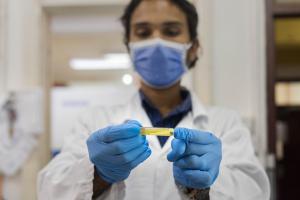Over two-thirds of Africans exposed to virus which causes COVID-19: WHO study
Brazzaville – Up to 65% of Africans have been infected by SARS-CoV-2, the virus which causes COVID-19, a World Health Organization (WHO) analysis finds. The study finds that true infections on the continent were 97 times larger than reported confirmed cases.
The analysis, which is available as a pre-print under peer review, synthesized 151 studies published on seroprevalence in Africa between January 2020 and December 2021. It found that exposure to SARS-CoV-2 skyrocketed from 3% (1.0-9.2% range) in June of 2020 to 65% (56.3-73% range) by September of 2021, or 800 million infections compared with 8.2 million cases reported at that time. The study showed that exposure to the virus rose sharply following the emergence of the Beta and the Delta variants.
The analysis revealed that the true number of infections could be as much as 97 times higher than the number of confirmed reported cases. This compares to the global average where true number of infections is 16 times higher than the number of confirmed reported cases.
However, seroprevalence varied widely within and across countries in Africa – higher in more dense urban areas than in less populated rural areas – and between age groups, with children aged 0-9 years having fewer infections compared with adults. Exposure to the virus also varied between countries and Africa’s sub-regions: seroprevalence appears to be highest in Eastern, Western and Central African regions.
The new analysis suggests that more than two-thirds of all Africans have been exposed to the COVID-19 virus. Globally seroprevalence studies have found a significant under-counting of cases occurring across the globe with 45.2% of the world’s population estimated to have been infected with the virus by September 2021. It is, however, difficult to compare figures for Africa with those of other regions, as many of the studies conducted cover different time periods.
The continent differentiates itself from other regions by its high number of asymptomatic cases, with 67% of cases having no symptoms.
“This analysis shows that current reported COVID-19 confirmed cases are only a fraction of the actual number of infections on the continent,” said Dr Matshidiso Moeti, WHO Regional Director for Africa. “This under-counting is occurring world-wide and it’s no surprise that the numbers are particularly large in Africa where there are so many cases with no symptoms.”
Seroprevalence studies provide data on asymptomatic or under-reported infections that may have been missed by routine diagnostic testing, which in Africa has focused on travellers and people who came to hospitals with COVID-19 symptoms. While this new analysis provides insight into the evolution of the pandemic, routine testing remains a critical component of the COVID-19 pandemic in all countries.
“Testing enables us to track the virus in real-time, monitor its evolution and assess the emergence of new variants. Countries must ramp up testing, contact tracing and surveillance so we can stay a step ahead of COVID-19,” said Dr Moeti.
As of 6 April 2022, there were 11.5 million confirmed cases and more than 252 000 deaths reported on the continent. It is likely that numbers of actual exposure to the virus have increased even more since September 2021.
Africa has had milder COVID-19 cases compared with other parts of the world because there is a comparatively smaller proportion of people with risk factors such as diabetes, hypertension and other chronic diseases that are associated with more severe cases and deaths. Africa’s youthful population is also a protective factor.
“Despite Africa’s declining infections and high exposure to the virus, we cannot declare victory yet against COVID-19,” Dr Moeti said. “The seroprevalence analysis shows just how much the virus continues to circulate, particularly with new highly transmissible variants. The risks of more lethal variants emerging which overwhelm immunity gained from past infections cannot be brushed aside. Vaccination remains a key weapon in the fight against COVID-19.”
Multiple studies have shown that vaccination for those with prior infection is beneficial resulting in improved protection over infection-induced immunity alone. Africa has to date fully vaccinated 209 million people, or 16% of the population, administering 457 million of the 816 million vaccine doses received. WHO is working to support countries ramp-up vaccination.
Dr Moeti spoke during a virtual press conference today. She was joined by Professor Guéladio Cissé, Coordinating Lead Author, Intergovernmental Panel on Climate Change, Swiss Tropical and Public Health Institute, University of Basel, Switzerland, and Dr Irene Owusu Donkor, Postdoctoral fellow, African Postdoctoral Training Initiativeand Research fellow, Noguchi Memorial Institute for Medical Research, Ghana.
From the WHO Regional Office for Africa, Dr Joseph Okeibunor, Team Lead, Research Development and Innovations, Dr Thierno Balde, Regional COVID-19 Incident Manager, Dr Edinam Amavi, Vaccine Safety Officer, and Dr Brama Koné, Technical Officer, Climate Change and Health, were also on hand to answer questions.
Media Relations Officer
WHO Regional Office for Africa
Email: dalalm [at] who.int (dalalm[at]who[dot]int)
Tel: +254 703 245 761 (WhatsApp)
Communications Manager
WHO Regional Office for Africa
Email: okas [at] who.int (okas[at]who[dot]int)
Tel: +242 06 508 1009



